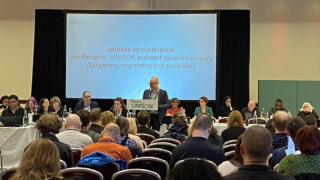UNISON vowed to work with other unions for an end to poverty pay in the country’s universities, its higher education service group decided today.
Delegates at the union’s higher education conference in Chester voted this morning for a pay campaign to include:
- a pay rise of £1,500 a year or 7.5% – whichever is higher;
- for all employers to pay the real living wage and work towards a minimum rate of £10 an hour in the sector;
- eradicating the gender pay gap by 2020;
- an end to zero-hour contracts.
And it called for the campaign to be backed by the possibility of escalating, lawful industrial action co-ordinated with other higher education unions.
This followed debate on a number of motions highlighting areas of concern and campaigning priorities on pay.
The high pay of senior managers, including vice chancellors, was highlighted recently in news reports around the vice chancellor at the University of Bath. And it was a recurring feature in the pay debate.
At Bath, for instance, the pay ratio between the vice chancellor and the lowest paid staff members is 30 to one.
That means that, by the end of the first day in a month, the vice chancellor has earned more than the lowest paid worker at the university will get for the entire month’s work.
Cymru/Wales delegate Carol Dumfy told delegates she was “sick of being preached at by university managements about how we are all in this together – while vice chancellors and other senior management seem to have found the government’s magic money tree.”
UNISON’ annual freedom of information request shows that the average university vice chancellor’s pay is £278,000 a year; but that is just the average – pay rates of up to £451,000 a year have hit the headlines.
“Our members deserve the same consideration,” service group chair Denise Ward declared.
Calling for ‘Fair pay for the many not the few’, she told conference: “We need to keep focus on our members’ plight,” pointing out that they have lost the equivalent of between £1,600 and £8,500 over the years of pay restraint.
The reality of what that means was brought to conference by Katy Hall from the national women’s committee, who told of taking calls from members who ask where they can access a local food bank.
“The gloves are off,” declared Ms Ward. “We need to do all we can. This year, more than ever, we need a strong campaign.”
Delegates took that call seriously, suspending the normal business of motions and speeches for a dedicated practical discussion on how to build the campaign for decent pay across the sector.





